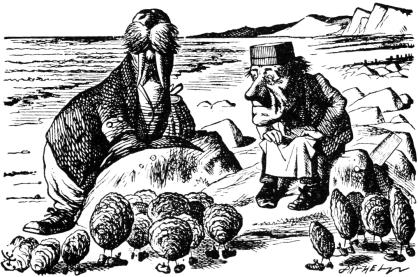

|
 Cooked oysters in vinegar with spices. WM 1658 uses mace, pepper and salt.  The Walrus and the Carpenter contemplate the Oysters Illustration by John Tenniel  Original Receipt in WM 1658; Original Receipt in WM 1658;To Pickle Oysters. Take Oysters and wash them cleane in their own Liquor, and let them settle, then strain it, and put your Oysters to it with a little Mace and whole pepper, as much Salt as you please, and a little Wine-Vinegar, then set them over the fire, and let them boyle leisurely till they are pretty tender; be sure to skim them still as the skim riseth; when they are enough, take them out till the Pickle be cold, then put them into any pot that will lye close, they will keep best in Caper barrels, they will keep very well six weeks.  Original Receipt in 'The Country Housewife and Lady's Director' by Prof. R Bradley, 1728 (Bradley 1728) Original Receipt in 'The Country Housewife and Lady's Director' by Prof. R Bradley, 1728 (Bradley 1728)At this Season, Cyders, Mussels, Cockles, and such kind of Shell-Fish are good and in Season; as for the Oyster, it is not only to be eaten raw, but makes an agreeable Dish stew'd, or in Scallop-Shells; and besides, being useful in many Sauces, are extremely good when they are well pickled. Altho' the Oyster may seem foreign to a Farm, or some part of the Country, yet considering that we live in a part of the World surounded with a Sea that produces the best Oysters, and that they are a sort of Shell-Fish which we can keep a long time, and feed them, I think it necessary to take notice of them. About Colchester the Oyster-Pits are only small Holes about twelve foot square, by the side of the River, where the salt Water comes up, and has a passage into them at the height of the Tides; in these places the Oysters are laid, and there grow fat, and become green, by a sort of Weed which is called Crow-Silk: and this may be done any where, if there is a River with salt Water, as well as by Colchester, and be kept two or three Months; so that I wonder 'tis not practised in other places. But if we have not this conveniency, yet if we lay them in Salt and Water after the Shells are well wash'd, just when they come from the Sea, they will keep a Fortnight in pretty good order, if the Weather be cool, and they can have the open Air; but then the Salt and Water should be changed every four and twenty hours. The following Receipts are very good for preparing them for the Table. ... To pickle Oysters. Open a quantity of large Oysters, saving their Liquor, and letting it settle; then pour the Liquor clear off into a Stew-pan, and wash the Oysters in Water and Salt: after which, boil them gently in their own Liquor, so that they are not too hard. When they are enough, take them out, and add to the Liquor some Mace, a few Cloves, some whole Pepper, a little Ginger, and a Bay-Leaf or two, and let the Liquor boil, putting to it about a fourth part of White-wine Vinegar, letting it continue to boil a little more; then take it off, and let it stand to be quite cold. When the Oysters are cold, put them into Jars or Gally-pots, and pour the Liquor with the Spice cold upon them; then tie them down with Leather. The Mussel and Cockle may be pickled after the same manner, only allowing this difference; i.e. that Cockles and Mussels are taken out of their Shells by setting them over the Fire, and opening them by the Heat; but before-hand the Shells must be wash'd very clean, and then must be put in the Sauce-pan without Water, they of themselves will soon produce Liquor enough: then as the Shells open, take out the Fish, and wash every one well in Salt and Water; but as for the Mussels, they must every one be carefully look'd into, and discharg'd from that part which is call'd the Beard, and also particular care must be taken to examine whether there are any Crabs in them, for they are very poisonous, and as they lie in the Mouth of the Mussel, may easily be discover'd; they are commonly as large as a Pea, and of the shape of a Sea-Crab, but are properly Sea-Spiders: the Mussels however where you find them, are not unwholesome, and it is only the eating of this little Animal, which has been the occasion of People's swelling after they had eaten Mussels, but the goodness of the Fish is well enough worth the Care of looking after that. When your Mussels or Cockles are all clean pick'd and wash'd, lay them to cool; and when their Liquor is well fettled, pour off the Clear, and boil it up with the same sort of Spices mentioned above for the pickled Oysters, with the same proportion of Vinegar; and letting it stand till it is quite cold, put your Fish into proper Pots, or little Barrels, and pour the Liquor upon them till they are cover'd with it, and stop them up close: they will keep good two or three Months, if the Liquor is now and then boiled up, but it must be always cold before it be put upon the Fish. In the Management of Cockles for pickling, or for eating any other way, let the Shells be very well wash'd, and then lay the Cockles in a Pan of Salt and Water for two or three days, to scour themselves from the Sand that is in them at their first taking; but observe to shift the Salt and Water every day. The largest Cockles that I have observ'd on the English Coasts are those found about Torbay, which are sometimes brought to Exeter Market; the Fish is as large as a good Oyster, and the Shells of some are above two Inches and a half Diameter. Mussels and Cockles may likewise be stew'd and grill'd in Scallop Shells, as directed for Oysters. The Mussels after they are well pick'd are flower'd and fryed in some places, and eaten with Butter and Mustard, and the French make rich Soups of them.  |
|
MORE FROM Foods of England... Cookbooks ● Diary ● Index ● Magic Menu ● Random ● Really English? ● Timeline ● Donate ● English Service ● Food Map of England ● Lost Foods ● Accompaniments ● Biscuits ● Breads ● Cakes and Scones ● Cheeses ● Classic Meals ● Curry Dishes ● Dairy ● Drinks ● Egg Dishes ● Fish ● Fruit ● Fruits & Vegetables ● Game & Offal ● Meat & Meat Dishes ● Pastries and Pies ● Pot Meals ● Poultry ● Preserves & Jams ● Puddings & Sweets ● Sauces and Spicery ● Sausages ● Scones ● Soups ● Sweets and Toffee ● About ... ● Bookshop ● Email: editor@foodsofengland.co.uk COPYRIGHT and ALL RIGHTS RESERVED: © Glyn Hughes 2022 BUILT WITH WHIMBERRY |